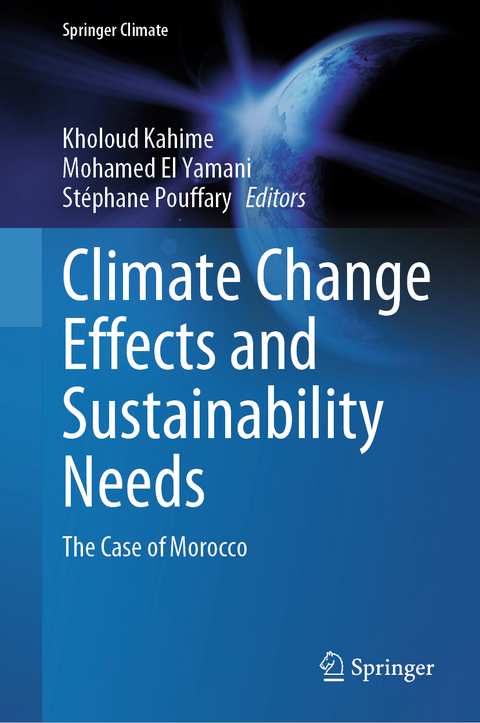
Climate Change Effects and Sustainability Needs
Springer International Publishing (Verlag)
978-3-031-59602-5 (ISBN)
This book provides simultaneously, a cross-sectoral, multi-scale assessment of climate change issues in Morocco and proposes levers of action and innovative practices to be used to strengthen the resilience and adaptation strategies. The book offers the opportunity to debate contemporary mutations, the paradigms of change as a complex process, the dynamics of values, the complexity of the issues and the opportunities for transformation, starting from a reflective approach on the historical, scientific, theoretical and strategic dimensions of action, creativity and environmental innovation in a perspective of sustainability.
Dr. Kholoud Kahime was born in Marrakech; she obtained her Baccalaureate in "Experimental Sciences." Afterward, she started his high university studies and graduated in 2008 from Cadi Ayyad University (Morocco) with a bachelor degree in Biology and Environment option. She graduated from Ibn Zohr University with Master's degree in "Environment and Health Sciences" and she won university merit award. She got her Ph.D. in December 2016 on Ecology, Epidemiology and Climate Change from Cadi Ayyad University.
Pr. Kholoud Kahime is currently a professor-researcher at the School of Technology, Essaouira, Cadi Ayyad University of Marrakech, and a member of the Research Laboratory for Applied Sciences for the Environment and Sustainable Development (SAEDD). Her research focuses on environment, climate change, health and sustainable development. Her research has resulted more than 30 articles and chapters published in indexed and prominent, influential journals, one of which is cited in the IPCC report, (2014), 3 books, alongside more than 60 oral and Poster presentations were presented in France, Tanzania, UK, USA, Spain, Monaco, Holland, Germany, Poland, Monaco, Morocco, Turkey and Brazil.
Mohamed El Yamani is a researcher and lecturer at Graduate School of Technology - Essaouira, Cadi Ayyadi University (Morocco), and is member of the Research Laboratory for Applied Sciences for the Environment and Sustainable Development (SAEDD). He holds a Doctorate Degree in Environmental Sciences and Engineering (2019) from the Faculty of Science and Technology, Sidi Mohamed Ben Abdellah University, Fez (Morocco). Before that, he graduated in Environmental Engineering from the National School of Applied Sciences of Al Hoceima, Mohammed 1st University (Morocco). Research interests of Prof EL YAMANI include environmental stress, ecology, plant physiology and adaptation, environmental engineering, wastewater treatment and valorization, and environmental impact studies. He has published numerous articles and books in the above-mentioned fields. He has also contributed to the publication of several research articles in various well-indexed journals, as a reviewer and guest editor. He is a co-organizer of several international workshops, conferences and symposia.
Stéphane POUFFARY works in the field of international cooperation and development for more than 35 years. He is the founder and the Chief Executive Officer of ENERGIES 2050, a network and an association committed, for more than 20 years, for a new development model. The association is active in over 70 countries and implements innovative, demonstrative and replicable projects in as many countries working with a systemic, multi-level and inclusive approach to address climate change, environmental, energy and socio-economic challenges for international institutions, national and local governments as well as multi-stakeholder coalitions.
Stéphane has worked for several international and national institutions and has set up, coordinated, and participated in more than 250 international projects supporting international institutions, national and subnational governments, local authorities as well as multi-stakeholders' coalitions. He is a specialist in the development and implementation of strategies to fight climate change and of programs of actions and low-carbon development projects with high innovation potential in the fields of mitigation, adaptation, resilience, sustainable cities, and territories in addition to capacity building programs and access to climate finance. Stéphane has extensive experience in a significant number of countries worldwide. He is the author of over 200 technical publications.
He has also founded or co-founded and is involved in several international initiatives (Climate Task Force of United Cities and Local Governments of Africa (UCLG Africa), ART's PLANET, Francophonie Initiative for Sustainable Cities (IFVD), Globa
Introduction.-
Part I. Climate Observation and Prediction in Morocco.- Chapter 1. Climate
change projection and numerical climate modeling in the Rheris watershed
(Region Draa Tafilalet -Morocco). Sultan Moulay Slimane University, Morocco. Chapter
2. Are the heat waves recorded in Morocco during the summer of 2022
exceptional? Sidi Mohamed Ben Abdellah University, Morocco.- Chapter 3. Climatic
drought in the Oum Er Rbia hydraulic basin- Morocco (1980-2021): Statistical
and cartographic analysis. Sultan Moulay Slimane University, Morocco.- Part II.
Climate Change effects on Ecosystems and Water Resources: Politics of
Adaptation.- Chapter 4. Genetic control of Bactrocera oleae gmelin (Diptera:
Tephritidae) as a means to mitigate the effect of climate change.
Université IbnoTofail, Kénitra.- Chapter 5. Predicting potential reforestation
areas by Quercus ilex(L.) species using machine learning algorithms:
case of Ziz upper watershed, southeastern Morocco. Université Ibno Tofail,
Kénitra.- Chapter 6. Description and analysis of the hydrological regimes of
the source of Ain Asserdoune "Atlas of Beni Mellal-Morocco". Sultan Moulay
Slimane University, Morocco.- Part III. Climate Change and Adaptation focus on
Agricultural Sector.- Chapter 7. Resilience of extensive livestock reared in
agropasoral vs. sylvoagropastoral systems to cope with drought in Morocco.
National Institute for Agronomic Research, Morocco.- Chapter 8. Irrigation of
maize (Zea mays L.) with activated sludge-treated municipal wastewater:
the effects on the early plant growth and oxidative stress parameters. Sultan
Moulay Slimane University, Cadi Ayyad University.- Chapter 9. Genetic Progress
in Physiological and Biochemical Traits Related to Grain Yield in Moroccan
Durum Wheat Varieties from 1984 to 2007. Sidi Mohamed Ben Abdellah University,
Cadi Ayyad University.- Part IV. Urbanism, Green Building and Land Use: What
can we do in the face of climate change?.- Chapter 10. A review of life cycle assessment
method for building: what is alternative to Morocco? Sidi Mohamed Ben Abdellah
University, Savoie Mont Blanc University.- Chapter 11. The impact of industrial
activities on the surface temperature (LST) in the urban environment of the
city of Kenitra (Morocco). Moulay Slimane university of Beni Mellal, Morocco.-
Chapter 12. Rain gardens for a new climate change mitigation system. UAE
Tétouan, Morocco.
| Erscheinungsdatum | 09.07.2024 |
|---|---|
| Reihe/Serie | Springer Climate |
| Zusatzinfo | VIII, 204 p. 99 illus., 82 illus. in color. |
| Verlagsort | Cham |
| Sprache | englisch |
| Maße | 155 x 235 mm |
| Themenwelt | Naturwissenschaften ► Geowissenschaften ► Meteorologie / Klimatologie |
| Schlagworte | Agriculture and land use • Biodiversity and health • Biodiversity and nature-based solutions • Climate change consequences and impacts • Climate change issues in Morocco • Flooding, drought, water scarcity and heat stress • Food and water security • Morocco • water resources |
| ISBN-10 | 3-031-59602-1 / 3031596021 |
| ISBN-13 | 978-3-031-59602-5 / 9783031596025 |
| Zustand | Neuware |
| Informationen gemäß Produktsicherheitsverordnung (GPSR) | |
| Haben Sie eine Frage zum Produkt? |
aus dem Bereich


